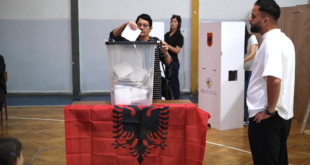 A court in the city of Vlora Albania, sentenced on Tuesday, to a six-month prison term and a 500,000 Lek (€3,800) fine, an ethnic-Greek mayor who was indicted for ordering the dismantlement of road signs because they were not bilingual, causing subsequent traffic chaos and damage to public property.
A court in the city of Vlora Albania, sentenced on Tuesday, to a six-month prison term and a 500,000 Lek (€3,800) fine, an ethnic-Greek mayor who was indicted for ordering the dismantlement of road signs because they were not bilingual, causing subsequent traffic chaos and damage to public property.
Mayor Vasil Bollano of the town of Himara on Albania’s coast, ordered the removal of road signs in December 2007, arguing that the signs should also have been written in Greek, as he considers the area a Greek-minority zone.
The removal of the road signs caused traffic chaos because they were along a section of road that belongs to Albania’s coast which is very popular with tourists. Prosecutors filed charges against Bollano for abuse of power, arguing that his actions were against the law and that the removed signs cost Albanian taxpayers roughly €170,000.
During the final hearing of the case, Bollano’s lawyer tried to paint his client’s indictment as politically motivated and xenophobic because Bollano is also the head of an ethnic Greek minority organization ‘Omonia’. However, prosecutors rebuffed those statements by arguing that this was not possible as the mayor himself had declared his nationality as Albanian during questioning.
According to the ruling, the mayor will also be barred for three years from holding public office.
Bollano’s statements have gotten him in hot water before. He has previously declared large areas of southern Albania as ‘Greek land’ and claimed autonomy for the region.
Estimates of the Greek minority in Albania range from two to seven per cent of the total population.
Tirana has also turned down his demands for ‘special status’, arguing that the size of the local Greek community is far too small to warrant such status. At the same time, Tirana treads carefully with the mayor, mindful of its powerful neighbour to the south.
However, the government’s tread-lightly approach has angered some Albanians who feel Tirana has been too lenient on Bollano. They have been infuriated by his threats that if the authorities make any major moves against him, Albania’s EU aspirations will be compromised.
That Greece is host to Albania’s largest emigrant community in Europe, and that their remittances are a lifeline for its weak economy, especially in the south, is another aspect to factor into the equation. Although Athens broadly supports Albania’s goal of eventual EU and NATO membership, it has also shown it is ready to use the fate of the countless Albanian immigrants in Greece as a political pawn when the going gets tough.
 Eurasia Press & News
Eurasia Press & News


